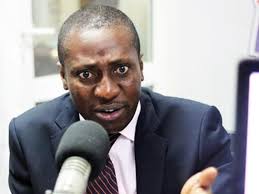Dr. Alex Ampaabeng calls for abolishment of E-levy …Says the policy is still failing.
Dr. Alex Ampaabeng calls for abolishment of E-levy …Says the policy is still failing.

A Tax analyst, Dr. Alex Ampaabeng, has called on the government to abolish the unpopular Electronic Transfer Levy (E-levy).
In his view, the policy ought to be reviewed or scrapped entirely despite the recent announcement of an increase in the revenues generated from the E-Levy,
He stated that “E-levy as it stands, I would say it has failed, and it’s got to the point where the government has to review it, probably reduction in rates if it’s not to be abolished. The government needs to look at reducing the rates to make it less attractive for people not to pay. But as it stands, If you spend about GHS5000, and you’re going to pay maybe an e-levy of close to GHS100, surely the person would rather spend time and go to the bank to do physical transactions. And you also need to look at what impact this is having on the broader economy.”
The Ghana Revenue Authority (GRA) indicated over the weekend that the levy has so far recorded a 20 percent improvement month on month and expects to see more growth subsequently.
As of September this year, data from the GRA indicates that about GHC328 million has been realised from the Electronic Transfer Levy (E-Levy).
This is a significant improvement from the GHS60 million achieved in June, although it still raises concerns about the government’s ability to meet the projected 2022 target of GHC600 million with just about months to end the year.
This is further heightened by records showing a dip in mobile money transactions since the introduction of the policy, as some resort to cash transactions and other creative means to avoid the levy.
Demands for the scrapping of the policy have been rife since its inception, but with the economy currently in dire straits and seeking an IMF bailout, what options are available to the government if it were to heed the call?
Dr. Ampaabeng is of the view that there is a way around it.
“What will solve Ghana’s problem is having substantial domestic revenue. We need a revenue base that will guarantee every year in and year out. IMF is going to be a one-off package to support the economy, but post-IMF what happens? And that is why we keep slipping back. The country is not generating enough and it is time for us to do a proper system audit, and look at which areas can we really generate revenue. Property tax is one.”
“We’ve passed the tax exemptions bill but people are enjoying at the ports. We recently heard of the La Bianca issue. This is one out of many. Cargoes are coming out of the port every single day and people are not paying the right amount. So it is time for us to really do a proper systems audit, seal all the leakages, and tackle corruption with a much more deterrent punishment to make it less attractive for people to engage in.” he added
The government had hoped to rake in about GH₵6.9 billion from the collection of the levy on mobile money and other electronic transactions, but the figure was revised downwards to about GH₵4.9 billion following the delay in the passage of the e-levy bill.
It was once again revised to GH₵611 million in the midyear budget review.
The levy, which was initially pegged at 1.75 percent on mobile money and other electronic transactions, was later reduced to 1.5 percent following protests from various stakeholders.
After the delay in the passage of the e-levy bill by Parliament, it was predicted that the levy will not achieve its intended target.




